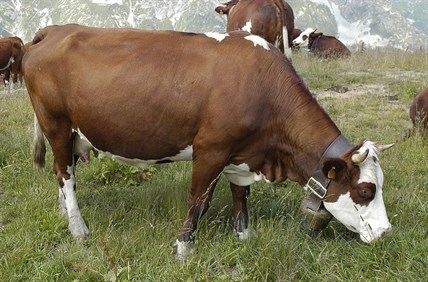
Image Credit: Wikimedia Commons
August 28, 2013 - 2:33 PM
VERNON - This week, the Ministry of Agriculture announced that bidding is open for five new slaughterhouse licenses in the North Okanagan, but a local cattle farmer isn't sure who is going to apply for them.
The Class E licenses allow on-farm slaughters of up to ten animals for direct sale to consumers, rather than having to transport them to an abattoir to have the processing done. The experimental licenses are part of a pilot project announced last spring in response to concerns that the system had devastated small, local farmers since it came into effect in 2007.
"In the North Okanagan, we went from 1,200 livestock producers to 300," Don Hladych of Vale Farms in Lumby says. "We've lost too many small scale slaughterhouses. There's only one certified organic slaughterhouse in the area."
In order to maintain its status as organic, Vale Farms has to have its meat slaughtered in a certified organic abattoir. At the moment, Riverside Natural Meats in Salmon Arm is the only option.
"If we lost it, I don't know where we'd go," Hladych says. "Having a dependable place to slaughter is the single biggest risk in this industry."
More appealing to him would be to build his own slaughterhouse on Vale Farms, but for that to happen, the province would have to enact an exemption law. Instead, they're offering just five licenses to replace the 900 lost livestock producers, Hladych says.
"Ten animals (permitted under Class E) is a hobby farm, maybe $1,500 in earnings a year. They need to give an exemption that allows a professional farmer to survive."
People farming on that small scale won't bother to apply for the license either, Hladych says.
"They've been slaughtering illegally off the radar for ten years without a problem. They're not going to come on board with the regulations now. There's no point. Nobody is going to apply for these licenses," he says. "It's a trap... the government will say no one applied, and use that as proof that the system is adequate."
While the government cites health concerns as the purpose of the licensed abattoir only regulations, Hladych says they're achieving the opposite. With slaughters concentrated in fewer facilities, he says the risk of contamination is greatly increased. With numerous smaller facilities, on the other hand, less product will be impacted.
And for local farmers like himself, there's every reason to maintain a safe product.
"I could not cut a corner and do something that puts my clients at risk," he says. "I couldn't sell a single pound of meat if people didn't trust me."
To contact the reporter for this story, email Charlotte Helston at chelston@infotelnews.ca, call (250)309-5230 or tweet @charhelston.
News from © iNFOnews, 2013